Bar/None
The Swimming Pool Q's were part of the early-80's Athens scene thatspawned R.E.M. and The B-52's. Maybe it was because of their idioticband name or perhaps it was the witty sophistication of theiroff-kilter pop music, but The Swimming Pool Q's never achieved afraction of the notoriety and success experienced by their Athenscontemporaries, despite their tenure on a major label. They haven'treleased an album since 1989, and just when it seemed safe tocompletely write the band off, The Swimming Pool Q's have released
Royal Academy of Reality,an ambitious and masterful concept album that makes anything from theirback catalog seem downright irrelevant. This mammoth 20-track,70-minute song cycle belongs to that rare category of rock albums thatare perfectly executed studio creations. As with The Beach Boys'
Pet Sounds, Love's
Forever Changes, or Todd Rundgren's
A Wizard, A True Star,bandleader and producer Jeff Calder uses the studio as a canvas,elevating his compositions to the level of genius through a staggeringassortment of instruments, sound effects and overdubs. Apparently, thisalbum was 10 years in the making, which, on the surface seems absurd,until the level of detail in the richly layered musical tapestry ofeach meticulously considered track is heard. While the songwriting isoften little more than ordinary, and the lyrics are a bit overwroughtand ponderous, Jeff Calder's aspirations to the studio wizardry ofBrian Wilson, Phil Spector and Jack Nitzsche pays off brilliantly. Theconcept of
Royal Academy of Reality is every bit as vague and tenuous as those of
Forever Changes or
Tales From Topographic Oceans—apparentlyit's got something to do with love, death, happiness and Egyptiancosmology. In the end, the concept is not what makes
Royal Academya masterpiece. It's about the pure complexity of its own creation andthe seamless ebroideredy of its production: every potential millisecondof silence is filled with sound, not a moment left untouched. Calder'sinsistence on pure artifice and flawless, crisply reproducedinstruments recalls the slick perfection of Steely Dan's
Katy Lied.True to form, the album opens with the sequenced synthesizer arpeggiosof "Introduction to Time," then segues into the dime-store mysticism of"Light Arriving Soon," a slightly saccharine power-pop song adrift inan oceanic symphony that includes Hammond organ, accordion, Appalachaindulcimer, Mellotron, Arp String Ensemble in addition to traditionalrock instruments and layers upon layers of harmonized, multi-trackedvocals. Perusing the liner notes, which painstakingly detail theoutrageous assortment of instruments and sound effects used in theoverdubs of each track, becomes entertaining in itself—Mini Moog, toypiano, tenor sax, congas, Waldorf Microwave, ape bone, fish, bottlecaps, Flexitone, shoe gong, etc. ad nauseum. I admire the sheeraudacity and ambition that led the Q's to record an album so out ofstep with its times. In this era of stripped-down garage rock andPowerbook pop, Jeff Calder and company have made an album whichgloriously resurrects the progressive chamber-pop of the 70's. A few ofthe tracks stand out from the others—the epic sound effects suite of"The Discovery of Dawn" or the sad refrain of "The Radio inMemphis"—but most of these songs just blend seamlessly into a byzantinewhole, like movements of a vast concerto. I am certain that most willfind
Royal Academy of Reality to be hopelessly outmoded and convoluted, but I stand in awe of its multifaceted, meticulous brilliance.
samples:
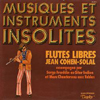 One would think the novelty market would have fortuitously unearthed all of the world's great flute masterpieces by now. Perhaps, though, there is still room in the annals for two more. In fact, the reason I even hesitate from declaring these the best two is for lack of really hearing any others. Regardless, it happened that in the early 70s, French flutist/bassist Jean Cohen-Solal recorded two largely unheard, flute-dominated records in which his seasoned psychedelic and progressive sensibility met the potent influence of avant-garde and classical ideas.
One would think the novelty market would have fortuitously unearthed all of the world's great flute masterpieces by now. Perhaps, though, there is still room in the annals for two more. In fact, the reason I even hesitate from declaring these the best two is for lack of really hearing any others. Regardless, it happened that in the early 70s, French flutist/bassist Jean Cohen-Solal recorded two largely unheard, flute-dominated records in which his seasoned psychedelic and progressive sensibility met the potent influence of avant-garde and classical ideas.


 The Swimming Pool Q's were part of the early-80's Athens scene thatspawned R.E.M. and The B-52's. Maybe it was because of their idioticband name or perhaps it was the witty sophistication of theiroff-kilter pop music, but The Swimming Pool Q's never achieved afraction of the notoriety and success experienced by their Athenscontemporaries, despite their tenure on a major label. They haven'treleased an album since 1989, and just when it seemed safe tocompletely write the band off, The Swimming Pool Q's have released Royal Academy of Reality,an ambitious and masterful concept album that makes anything from theirback catalog seem downright irrelevant. This mammoth 20-track,70-minute song cycle belongs to that rare category of rock albums thatare perfectly executed studio creations. As with The Beach Boys' Pet Sounds, Love's Forever Changes, or Todd Rundgren's A Wizard, A True Star,bandleader and producer Jeff Calder uses the studio as a canvas,elevating his compositions to the level of genius through a staggeringassortment of instruments, sound effects and overdubs. Apparently, thisalbum was 10 years in the making, which, on the surface seems absurd,until the level of detail in the richly layered musical tapestry ofeach meticulously considered track is heard. While the songwriting isoften little more than ordinary, and the lyrics are a bit overwroughtand ponderous, Jeff Calder's aspirations to the studio wizardry ofBrian Wilson, Phil Spector and Jack Nitzsche pays off brilliantly. Theconcept of Royal Academy of Reality is every bit as vague and tenuous as those of Forever Changes or Tales From Topographic Oceans—apparentlyit's got something to do with love, death, happiness and Egyptiancosmology. In the end, the concept is not what makes Royal Academya masterpiece. It's about the pure complexity of its own creation andthe seamless ebroideredy of its production: every potential millisecondof silence is filled with sound, not a moment left untouched. Calder'sinsistence on pure artifice and flawless, crisply reproducedinstruments recalls the slick perfection of Steely Dan's Katy Lied.True to form, the album opens with the sequenced synthesizer arpeggiosof "Introduction to Time," then segues into the dime-store mysticism of"Light Arriving Soon," a slightly saccharine power-pop song adrift inan oceanic symphony that includes Hammond organ, accordion, Appalachaindulcimer, Mellotron, Arp String Ensemble in addition to traditionalrock instruments and layers upon layers of harmonized, multi-trackedvocals. Perusing the liner notes, which painstakingly detail theoutrageous assortment of instruments and sound effects used in theoverdubs of each track, becomes entertaining in itself—Mini Moog, toypiano, tenor sax, congas, Waldorf Microwave, ape bone, fish, bottlecaps, Flexitone, shoe gong, etc. ad nauseum. I admire the sheeraudacity and ambition that led the Q's to record an album so out ofstep with its times. In this era of stripped-down garage rock andPowerbook pop, Jeff Calder and company have made an album whichgloriously resurrects the progressive chamber-pop of the 70's. A few ofthe tracks stand out from the others—the epic sound effects suite of"The Discovery of Dawn" or the sad refrain of "The Radio inMemphis"—but most of these songs just blend seamlessly into a byzantinewhole, like movements of a vast concerto. I am certain that most willfind Royal Academy of Reality to be hopelessly outmoded and convoluted, but I stand in awe of its multifaceted, meticulous brilliance.
The Swimming Pool Q's were part of the early-80's Athens scene thatspawned R.E.M. and The B-52's. Maybe it was because of their idioticband name or perhaps it was the witty sophistication of theiroff-kilter pop music, but The Swimming Pool Q's never achieved afraction of the notoriety and success experienced by their Athenscontemporaries, despite their tenure on a major label. They haven'treleased an album since 1989, and just when it seemed safe tocompletely write the band off, The Swimming Pool Q's have released Royal Academy of Reality,an ambitious and masterful concept album that makes anything from theirback catalog seem downright irrelevant. This mammoth 20-track,70-minute song cycle belongs to that rare category of rock albums thatare perfectly executed studio creations. As with The Beach Boys' Pet Sounds, Love's Forever Changes, or Todd Rundgren's A Wizard, A True Star,bandleader and producer Jeff Calder uses the studio as a canvas,elevating his compositions to the level of genius through a staggeringassortment of instruments, sound effects and overdubs. Apparently, thisalbum was 10 years in the making, which, on the surface seems absurd,until the level of detail in the richly layered musical tapestry ofeach meticulously considered track is heard. While the songwriting isoften little more than ordinary, and the lyrics are a bit overwroughtand ponderous, Jeff Calder's aspirations to the studio wizardry ofBrian Wilson, Phil Spector and Jack Nitzsche pays off brilliantly. Theconcept of Royal Academy of Reality is every bit as vague and tenuous as those of Forever Changes or Tales From Topographic Oceans—apparentlyit's got something to do with love, death, happiness and Egyptiancosmology. In the end, the concept is not what makes Royal Academya masterpiece. It's about the pure complexity of its own creation andthe seamless ebroideredy of its production: every potential millisecondof silence is filled with sound, not a moment left untouched. Calder'sinsistence on pure artifice and flawless, crisply reproducedinstruments recalls the slick perfection of Steely Dan's Katy Lied.True to form, the album opens with the sequenced synthesizer arpeggiosof "Introduction to Time," then segues into the dime-store mysticism of"Light Arriving Soon," a slightly saccharine power-pop song adrift inan oceanic symphony that includes Hammond organ, accordion, Appalachaindulcimer, Mellotron, Arp String Ensemble in addition to traditionalrock instruments and layers upon layers of harmonized, multi-trackedvocals. Perusing the liner notes, which painstakingly detail theoutrageous assortment of instruments and sound effects used in theoverdubs of each track, becomes entertaining in itself—Mini Moog, toypiano, tenor sax, congas, Waldorf Microwave, ape bone, fish, bottlecaps, Flexitone, shoe gong, etc. ad nauseum. I admire the sheeraudacity and ambition that led the Q's to record an album so out ofstep with its times. In this era of stripped-down garage rock andPowerbook pop, Jeff Calder and company have made an album whichgloriously resurrects the progressive chamber-pop of the 70's. A few ofthe tracks stand out from the others—the epic sound effects suite of"The Discovery of Dawn" or the sad refrain of "The Radio inMemphis"—but most of these songs just blend seamlessly into a byzantinewhole, like movements of a vast concerto. I am certain that most willfind Royal Academy of Reality to be hopelessly outmoded and convoluted, but I stand in awe of its multifaceted, meticulous brilliance.  As music these days seems to perpetually mine the past for ideas ratherthan develop new ones, the notion of an Acid Revival or Renaissance hasstarted to emerge. As someone with a real background in the glory daysof rave culture and acid house, you'd expect new material from LukeVibert touted as Acid to be innovative yet deeply rooted in the historyof the music. Instead, YosepH,oddly enough his first album ever for Warp, is a journey far away fromthe dancefloor to a rather deep place somewhere inside Vibert's rectum.While many producers are rediscovering the power of the TB-303 in theirclub-oriented tracks, the thirteen songs presented here are largelynoodly, downtempo, and less than impressive. For roughly half thealbum, we are treated to forgetable throwaway cuts like "StanD'Infamy", "Harmonic" and "Slowfast." The other half are listenable,but equally unremarkable. "Synthax" would have some potential if thebeat were chunkier and the tempo doubled a la his recent work as AmenAndrews on Rephlex. The somewhat dubby "Freak Time Baby" consists of asteady groove with echoed synth stabs and a pointless vocal. There area few places on the CD where Vibert's formula seems to work enough towarrant a second listen. The first single "I Love Acid" stands outamong the bunch with a super catchy vocoded hook and bubbling bassline."Countdown" throws together two-step garage with 303 trickery for afunky result that deserved to be fleshed on more on this album. YosepHhad some real potential here, and Warp had a good chance to come out ontop with the first high-profile, high quality Acid album in years.Instead, we're left with an overhyped release of less than stellarsounds from a label perhaps past its prime in terms of relevance. Let'shope someone else gets this Acid Renaissance right so that YosepH is not the last word on the matter.
As music these days seems to perpetually mine the past for ideas ratherthan develop new ones, the notion of an Acid Revival or Renaissance hasstarted to emerge. As someone with a real background in the glory daysof rave culture and acid house, you'd expect new material from LukeVibert touted as Acid to be innovative yet deeply rooted in the historyof the music. Instead, YosepH,oddly enough his first album ever for Warp, is a journey far away fromthe dancefloor to a rather deep place somewhere inside Vibert's rectum.While many producers are rediscovering the power of the TB-303 in theirclub-oriented tracks, the thirteen songs presented here are largelynoodly, downtempo, and less than impressive. For roughly half thealbum, we are treated to forgetable throwaway cuts like "StanD'Infamy", "Harmonic" and "Slowfast." The other half are listenable,but equally unremarkable. "Synthax" would have some potential if thebeat were chunkier and the tempo doubled a la his recent work as AmenAndrews on Rephlex. The somewhat dubby "Freak Time Baby" consists of asteady groove with echoed synth stabs and a pointless vocal. There area few places on the CD where Vibert's formula seems to work enough towarrant a second listen. The first single "I Love Acid" stands outamong the bunch with a super catchy vocoded hook and bubbling bassline."Countdown" throws together two-step garage with 303 trickery for afunky result that deserved to be fleshed on more on this album. YosepHhad some real potential here, and Warp had a good chance to come out ontop with the first high-profile, high quality Acid album in years.Instead, we're left with an overhyped release of less than stellarsounds from a label perhaps past its prime in terms of relevance. Let'shope someone else gets this Acid Renaissance right so that YosepH is not the last word on the matter. 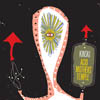 Kinski's Sub Pop debut Airs Above Your Stationis perhaps one of the most exciting records released this year. Therawkus sound and melodic variety, while not uncommon, is amazing tohear when done right. The group is firm in their powerful rock positionbut they have not lost sight of their modern psych and space rockconnections, basically the crowd which embraced them before anybodyelse. What's presented here is four songs: one each by Kinski and AcidMothers and two featuring both entities together. It's presented as asingle CD or a double vinyl set, with the attempts to weigh eachmember's contributions equally. The result, timewise, is unfortunatelyweighed heavily in AMT's favor. Kinski's tribute to Anne Heche, "FellAsleep On Your Lawn" gets things going and is an excellent tune forfans of their album. It's a 10+ minute demonstration of some boldguitar riffage and thunderous drumwork, both opening and closing onappropriate delicate moods. The two centerpieces of the release aredrum free excursions into the otherworldly. "It's Nice to Hear YourVoice" begins the collaborative work and its foundations are clearlymore Kinski than Acid Mothers: it's got a forward motion andprogressively builds momentum over the course of another 10+ minutes,accented with tablas and hypnotic, dreamlike effects which are notforeign to the Acid Mothers sound. After this point, however, theMothers take over with their initiated tracks, which, very similar to alot of Mothers material is meandering, wistful, and colored by drones,theremin-imitating synths, and bit of aimless noodling. While I realizethere may be a good number of hardcore AMT fans probably reading this,I have to step in and say that their music is becoming a bit too samey.(Even the title, "Planet Crazy Gold," seems all too predictable.) Atleast this number has a bit of Kinski left, probably providing theunderscoring bass pulses while the vocables twitter in the ether. At13+ minutes, it goes on way too long. Thankfully somebody got up fromtheir seat at some point to fade it out! (God I thought that wouldnever end! But much to my dismay, things got worse.) Thevertigo-influecing "Virginal Plane 5:23" closes the album with anotherbeast of absent harmonic motion, now provided by a psych rock guitarriff repeated ad nauseam. Once again, it's got echoing synth twitterswhich fade into a distorted mess, and sounds of wordless vocals. It'salso painfully accompanied by an overdose of blistering wanky guitarand cheap left-to-right panning effects which border on the completelyunlistenable. It continues on and on and on, progressively gettingworse. The five-minute mark comes and goes with absolutely no sensethat I'm anywhere different from where this song started. I'm remindedhow a "crescendo in volume" shouldn't take precedent over a thoughtfuldevelopment of melody and structure over time (anybody in a rock bandthat like to make similar music should take note). By about the eighthminute I'm sitting here wondering if anybody playing is actuallylistening to each other or just playing as loud as they can. Listeningbecomes laborious. 12 minutes go by, please make them stop! Am I theonly one thinking AMT just record all practice jam-sessions and decideto release them? 14 minutes pass and this album now becomes a test ofstamina. Had this been a concert, I would have been in the car and longgone by now. 15 minutes pass and it doesn't even sound like theoriginal guitarist and drummer who opened up the track care any more.18 minutes have elapsed, now this is just becoming sad. I need to takea break but I just can't. Something must happen right? The 20 minutemark comes and goes, as my stomach is now feeling the funk. Speaking ofFunk, Funkadelic did this over 30 years ago with "Free Your Mind AndYour Ass Will Follow," however they had the assistance of vocals andthe decency to end it before 10 minutes. After 22 minutes, theprominent opening two-bar guitar riff becomes prominent again.Hopefully this is a sign of things coming to a close. It doesn't happenuntil 26 minutes and proverbial mishmosh of complete noise and I'm leftfeeling the same as coming from a disappointing movie: more concernedabout the time in my life that I'll never get back than the moneyspent. It is such a disappointing end to a release which began with somuch hope.
Kinski's Sub Pop debut Airs Above Your Stationis perhaps one of the most exciting records released this year. Therawkus sound and melodic variety, while not uncommon, is amazing tohear when done right. The group is firm in their powerful rock positionbut they have not lost sight of their modern psych and space rockconnections, basically the crowd which embraced them before anybodyelse. What's presented here is four songs: one each by Kinski and AcidMothers and two featuring both entities together. It's presented as asingle CD or a double vinyl set, with the attempts to weigh eachmember's contributions equally. The result, timewise, is unfortunatelyweighed heavily in AMT's favor. Kinski's tribute to Anne Heche, "FellAsleep On Your Lawn" gets things going and is an excellent tune forfans of their album. It's a 10+ minute demonstration of some boldguitar riffage and thunderous drumwork, both opening and closing onappropriate delicate moods. The two centerpieces of the release aredrum free excursions into the otherworldly. "It's Nice to Hear YourVoice" begins the collaborative work and its foundations are clearlymore Kinski than Acid Mothers: it's got a forward motion andprogressively builds momentum over the course of another 10+ minutes,accented with tablas and hypnotic, dreamlike effects which are notforeign to the Acid Mothers sound. After this point, however, theMothers take over with their initiated tracks, which, very similar to alot of Mothers material is meandering, wistful, and colored by drones,theremin-imitating synths, and bit of aimless noodling. While I realizethere may be a good number of hardcore AMT fans probably reading this,I have to step in and say that their music is becoming a bit too samey.(Even the title, "Planet Crazy Gold," seems all too predictable.) Atleast this number has a bit of Kinski left, probably providing theunderscoring bass pulses while the vocables twitter in the ether. At13+ minutes, it goes on way too long. Thankfully somebody got up fromtheir seat at some point to fade it out! (God I thought that wouldnever end! But much to my dismay, things got worse.) Thevertigo-influecing "Virginal Plane 5:23" closes the album with anotherbeast of absent harmonic motion, now provided by a psych rock guitarriff repeated ad nauseam. Once again, it's got echoing synth twitterswhich fade into a distorted mess, and sounds of wordless vocals. It'salso painfully accompanied by an overdose of blistering wanky guitarand cheap left-to-right panning effects which border on the completelyunlistenable. It continues on and on and on, progressively gettingworse. The five-minute mark comes and goes with absolutely no sensethat I'm anywhere different from where this song started. I'm remindedhow a "crescendo in volume" shouldn't take precedent over a thoughtfuldevelopment of melody and structure over time (anybody in a rock bandthat like to make similar music should take note). By about the eighthminute I'm sitting here wondering if anybody playing is actuallylistening to each other or just playing as loud as they can. Listeningbecomes laborious. 12 minutes go by, please make them stop! Am I theonly one thinking AMT just record all practice jam-sessions and decideto release them? 14 minutes pass and this album now becomes a test ofstamina. Had this been a concert, I would have been in the car and longgone by now. 15 minutes pass and it doesn't even sound like theoriginal guitarist and drummer who opened up the track care any more.18 minutes have elapsed, now this is just becoming sad. I need to takea break but I just can't. Something must happen right? The 20 minutemark comes and goes, as my stomach is now feeling the funk. Speaking ofFunk, Funkadelic did this over 30 years ago with "Free Your Mind AndYour Ass Will Follow," however they had the assistance of vocals andthe decency to end it before 10 minutes. After 22 minutes, theprominent opening two-bar guitar riff becomes prominent again.Hopefully this is a sign of things coming to a close. It doesn't happenuntil 26 minutes and proverbial mishmosh of complete noise and I'm leftfeeling the same as coming from a disappointing movie: more concernedabout the time in my life that I'll never get back than the moneyspent. It is such a disappointing end to a release which began with somuch hope. 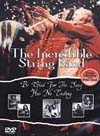 I can remember a time only a few years ago when professing an interest
in The Incredible String Band or any of their 1960's British psych-folk
contemporaries would immediately get one branded a clueless hippie
burnout. Now, following the band's recent reunion and some well-timed
reissues of their back catalog, The Incredible String Band are once
again being accepted back into the fold as the creators of an
impressive musical zeitgeist, idiosyncratic and highly influential.
Matmos have acknowledged the Incredibles as a big influence on their
newest album, and Current 93 have virtually mimicked them (down to a
replica of ISB's album cover) on Earth Covers Earth.
On the eve of Mike Heron and Robin Williamson's reunion concert in
London, playing alongside the likes of Acid Mothers Temple, Gong and
Damo Suzuki of Can, Wienerworld Video unveils a lost artifact from
their zenith creative period, the 50-minute film Be Glad for the Song Has No Ending.
This DVD contains the entire original film, which was produced for the
BBC but never aired, deemed far too odd and abstract for a television
audience. The DVD also contains a brief interview with director Peter
Neil, who takes pains to give the Incredibles full credit for the shape
and tone of the film. Be Glad is nothing like a typical
rockumentary. There are very few interviews with Heron and Williamson,
and when they do talk it's usually in philosophical aphorisms and
poetic reverie. Robin Williamson's glassy-eyed, beatific revelations
that "we are involved in the act of creation" really drives home the
peculiar mix of pagan and Gnostic ideas that inform his lyrics. Be Glad
tries to accomplish on film what the Incredibles do on record - a
whimsical, psychedelic journey through their eclectic music, their
communal lifestyle and their pastoral "Wicker Man" mysticism. The film
contains concert footage, including Williamson's hushed recitation of
his poem-manifesto "Head." There are terrific live-in-studio renditions
of classics such as "The Iron Stone" and "All Writ Down." At one point,
a road manager reads a list of all of the instruments used by the
Incredibles in a typical performance, and the sheer number of stringed
and percussive instruments needed to achieve their sublime ethno-folk
sound is absurdly comical. The last twenty minutes of the film is taken
up with a mystical passion play called "The Pirate and the Crystal
Ball," an allegorical tale set to an original ISB soundtrack, every bit
as surreal and outlandish as Kenneth Anger's Magick Lantern Cycle
films. It's clear that a lot of thought went into this film, and the
original music on the soundtrack is some of the Incredibles' finest and
most adventurous. Be Glad For the Song Has No Ending is an
indispensable document, capturing on film that strange spell that The
Incredible String Band were capable of weaving at the height of their
power.
I can remember a time only a few years ago when professing an interest
in The Incredible String Band or any of their 1960's British psych-folk
contemporaries would immediately get one branded a clueless hippie
burnout. Now, following the band's recent reunion and some well-timed
reissues of their back catalog, The Incredible String Band are once
again being accepted back into the fold as the creators of an
impressive musical zeitgeist, idiosyncratic and highly influential.
Matmos have acknowledged the Incredibles as a big influence on their
newest album, and Current 93 have virtually mimicked them (down to a
replica of ISB's album cover) on Earth Covers Earth.
On the eve of Mike Heron and Robin Williamson's reunion concert in
London, playing alongside the likes of Acid Mothers Temple, Gong and
Damo Suzuki of Can, Wienerworld Video unveils a lost artifact from
their zenith creative period, the 50-minute film Be Glad for the Song Has No Ending.
This DVD contains the entire original film, which was produced for the
BBC but never aired, deemed far too odd and abstract for a television
audience. The DVD also contains a brief interview with director Peter
Neil, who takes pains to give the Incredibles full credit for the shape
and tone of the film. Be Glad is nothing like a typical
rockumentary. There are very few interviews with Heron and Williamson,
and when they do talk it's usually in philosophical aphorisms and
poetic reverie. Robin Williamson's glassy-eyed, beatific revelations
that "we are involved in the act of creation" really drives home the
peculiar mix of pagan and Gnostic ideas that inform his lyrics. Be Glad
tries to accomplish on film what the Incredibles do on record - a
whimsical, psychedelic journey through their eclectic music, their
communal lifestyle and their pastoral "Wicker Man" mysticism. The film
contains concert footage, including Williamson's hushed recitation of
his poem-manifesto "Head." There are terrific live-in-studio renditions
of classics such as "The Iron Stone" and "All Writ Down." At one point,
a road manager reads a list of all of the instruments used by the
Incredibles in a typical performance, and the sheer number of stringed
and percussive instruments needed to achieve their sublime ethno-folk
sound is absurdly comical. The last twenty minutes of the film is taken
up with a mystical passion play called "The Pirate and the Crystal
Ball," an allegorical tale set to an original ISB soundtrack, every bit
as surreal and outlandish as Kenneth Anger's Magick Lantern Cycle
films. It's clear that a lot of thought went into this film, and the
original music on the soundtrack is some of the Incredibles' finest and
most adventurous. Be Glad For the Song Has No Ending is an
indispensable document, capturing on film that strange spell that The
Incredible String Band were capable of weaving at the height of their
power.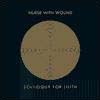
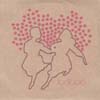 Last week when I was in Tokyo, I hit up on record stores with a list ofJapanese punk and indie bands and asked the staff in bad Japanese ifthey had any albums by these bands. After they found (or in most cases,didn't find) some of the bands, I'd ask them if they could recommendany bands based on my tastes. Everything recommended to me was great,but one release that I picked up in Shibuya was pure gold. The releaseis the unfortunately short but awesomely rocking Lostage. They onlyhave this three-song CD out right now, but it's on par with the bestmusic put out by Fugazi and June of 44. Hooks reminiscent of My BloodyValentine weave in and out of stop-n-go bass and drums, whilesinger/bass-player Takahisa Gomi's smooth voice belts out Japaneselyrics on the "Routine," the opener. On "Gatsuta," the hard guitar workof Masaya Shimizu and Takuto Gomi is remeniscent of Bedhead's"Psychosomatica," (the hard rockin one on Transaction de Novo).The closing third track, "2:18," once again returns to melodic hooksand a terrific stop-n-go beat, and has an aching longing quality to thefinal refrains that gives me the musical chills. And lest we forget,Tomokazu Tanaka's strong drumming keeps this whole enterprise together.This EP is truly a diamond amongst the gems I brought back from Japan.If you see a copy of this, for the love of God, knock down the personin front of you and grab it! Lostage's website is at
Last week when I was in Tokyo, I hit up on record stores with a list ofJapanese punk and indie bands and asked the staff in bad Japanese ifthey had any albums by these bands. After they found (or in most cases,didn't find) some of the bands, I'd ask them if they could recommendany bands based on my tastes. Everything recommended to me was great,but one release that I picked up in Shibuya was pure gold. The releaseis the unfortunately short but awesomely rocking Lostage. They onlyhave this three-song CD out right now, but it's on par with the bestmusic put out by Fugazi and June of 44. Hooks reminiscent of My BloodyValentine weave in and out of stop-n-go bass and drums, whilesinger/bass-player Takahisa Gomi's smooth voice belts out Japaneselyrics on the "Routine," the opener. On "Gatsuta," the hard guitar workof Masaya Shimizu and Takuto Gomi is remeniscent of Bedhead's"Psychosomatica," (the hard rockin one on Transaction de Novo).The closing third track, "2:18," once again returns to melodic hooksand a terrific stop-n-go beat, and has an aching longing quality to thefinal refrains that gives me the musical chills. And lest we forget,Tomokazu Tanaka's strong drumming keeps this whole enterprise together.This EP is truly a diamond amongst the gems I brought back from Japan.If you see a copy of this, for the love of God, knock down the personin front of you and grab it! Lostage's website is at 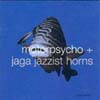 The tenth release in Konkurrent's In the Fishtank series sees the horn section of jazzy post-rockers Jaga Jazzist paired up with fellow Norwegians Motorpsycho. This Fishtankdiffers slightly from others past in that the bands had a significantlyinvolved relationship before the session was even proposed. Bandmembers have floated freely between the two acts, and both were set toplay a festival together in Holland at the time Konkurrentpropositioned them for collaboration. Such previous involvement,combined with an unprecedented amount of rehearsal time has resulted inthe first Fishtank with a fully integrated and time-craftedsound. The rough edges and obtuse proportions that made previouscollaborations sometimes fun, and more often forgettable, are missinghere. The Jaga horns lend a spacious fragility to Motorpsycho's burly,often blues-laden psych, but in a thoroughly accommodating fashion.True, the latter had been heading towards looser, kraut-ier pastures asof late, but with a horn section now on equal footing, Motorpsychofreely indulge in their Neu!-ish tendencies. Fears that anotherjazz-infected Fishtank might go the way of wankery (see therecent Sonic Youth + I.C.P + The Ex collaboration) can be dismissed, asnothing short of careful, studied fusion is achieved here. Fusion isthe only name for tracks like "Doffen Ah Um," with a groove seductiveenough to justify the title's Mingus reference. The bulk of this Fishtank,however, offers a less-boisterous blend with the most successful tracksserving as bookends on the disc. "Bombay Brassiere" and the 20-minutecloser "Tristano," showcase Motorpsycho's talent for dense, drivingpsych, made crystalline by a layering of horn and flute lines thatbring both tracks to dazzling crescendos, bursting with temperedimprovisation. Other portions of the disc are less appealing, such asthe stiff, white-boy funk put to a version of the Art Ensemble ofChicago classic "Theme de Yoyo." On "Pills, Powders and Passion Plays,"Motorpsycho's Bent Saether contributes his musty, damaged vocals, whichmay sound fine over that band's acid-headed rock, but make a PhilCollins tune of this slow jam.This disc has plenty of moments sure to please fans of both bands,though newcomers could do better with either of the Jaga Jazzist fulllengths on Ninja Tune.
The tenth release in Konkurrent's In the Fishtank series sees the horn section of jazzy post-rockers Jaga Jazzist paired up with fellow Norwegians Motorpsycho. This Fishtankdiffers slightly from others past in that the bands had a significantlyinvolved relationship before the session was even proposed. Bandmembers have floated freely between the two acts, and both were set toplay a festival together in Holland at the time Konkurrentpropositioned them for collaboration. Such previous involvement,combined with an unprecedented amount of rehearsal time has resulted inthe first Fishtank with a fully integrated and time-craftedsound. The rough edges and obtuse proportions that made previouscollaborations sometimes fun, and more often forgettable, are missinghere. The Jaga horns lend a spacious fragility to Motorpsycho's burly,often blues-laden psych, but in a thoroughly accommodating fashion.True, the latter had been heading towards looser, kraut-ier pastures asof late, but with a horn section now on equal footing, Motorpsychofreely indulge in their Neu!-ish tendencies. Fears that anotherjazz-infected Fishtank might go the way of wankery (see therecent Sonic Youth + I.C.P + The Ex collaboration) can be dismissed, asnothing short of careful, studied fusion is achieved here. Fusion isthe only name for tracks like "Doffen Ah Um," with a groove seductiveenough to justify the title's Mingus reference. The bulk of this Fishtank,however, offers a less-boisterous blend with the most successful tracksserving as bookends on the disc. "Bombay Brassiere" and the 20-minutecloser "Tristano," showcase Motorpsycho's talent for dense, drivingpsych, made crystalline by a layering of horn and flute lines thatbring both tracks to dazzling crescendos, bursting with temperedimprovisation. Other portions of the disc are less appealing, such asthe stiff, white-boy funk put to a version of the Art Ensemble ofChicago classic "Theme de Yoyo." On "Pills, Powders and Passion Plays,"Motorpsycho's Bent Saether contributes his musty, damaged vocals, whichmay sound fine over that band's acid-headed rock, but make a PhilCollins tune of this slow jam.This disc has plenty of moments sure to please fans of both bands,though newcomers could do better with either of the Jaga Jazzist fulllengths on Ninja Tune. Breaking beer bottles and initiating fights may be the best thing to dowhile listening to these destructive twenty minutes. Sloppy guitars andthe best use of a saxophone in such an energy-driven band propel thismusic into the realm of motorcycles, leather, and (strangely) girls inthose cute skirts that were popular during the 18's. Throw in a bit ofhumor and a taste for the obscene and what emerges is this brazen riotof sleaze. "The Nasty Show" is exactly what it sounds like: ahip-shaking melody is accentuated by a kick-ass sax lead before thevocalist decides that it's time to let his wavy voice puncture the airwith a slew of female background vocalists. The only downside to thefirst track is that the vocals are... well... a bit funny. At firstthis turned me off and then after a couple listens the humor and cheeseof it all just sank in somehow. "I want to fucking die for you / I wantto die fucking you / Fucking the day away / Why don't you come over andplay?" might look stupid on paper and certainly it sounds cheesey whenrecorded, but after awhile the raunch settles in nicely and there'snothing left to do but dance like a crazy drunk. Pink Grease is,without a doubt, indebted to some bands flying out of the past, buttheir combo of keyboard sounds, sax, guitars, and drums somehowelevates itself over the influences it draws from and leaves only the fun elements squarely in place. The helter-skelter vocals of "Susie" and the overall shakey ground that all of All Over Yourests upon keeps things interesting. Wearing a leather jacket may berequired for listening to this album, though. And switchblades must becarried in every man's pocket. Girls: wear those short skirts andfluffy sweaters and dance around as if you had no idea that any boymight wonder what's under your clothes. Pink Grease have written anasty little EP of near total expenditure; sexual, heavy, andhilarious.
Breaking beer bottles and initiating fights may be the best thing to dowhile listening to these destructive twenty minutes. Sloppy guitars andthe best use of a saxophone in such an energy-driven band propel thismusic into the realm of motorcycles, leather, and (strangely) girls inthose cute skirts that were popular during the 18's. Throw in a bit ofhumor and a taste for the obscene and what emerges is this brazen riotof sleaze. "The Nasty Show" is exactly what it sounds like: ahip-shaking melody is accentuated by a kick-ass sax lead before thevocalist decides that it's time to let his wavy voice puncture the airwith a slew of female background vocalists. The only downside to thefirst track is that the vocals are... well... a bit funny. At firstthis turned me off and then after a couple listens the humor and cheeseof it all just sank in somehow. "I want to fucking die for you / I wantto die fucking you / Fucking the day away / Why don't you come over andplay?" might look stupid on paper and certainly it sounds cheesey whenrecorded, but after awhile the raunch settles in nicely and there'snothing left to do but dance like a crazy drunk. Pink Grease is,without a doubt, indebted to some bands flying out of the past, buttheir combo of keyboard sounds, sax, guitars, and drums somehowelevates itself over the influences it draws from and leaves only the fun elements squarely in place. The helter-skelter vocals of "Susie" and the overall shakey ground that all of All Over Yourests upon keeps things interesting. Wearing a leather jacket may berequired for listening to this album, though. And switchblades must becarried in every man's pocket. Girls: wear those short skirts andfluffy sweaters and dance around as if you had no idea that any boymight wonder what's under your clothes. Pink Grease have written anasty little EP of near total expenditure; sexual, heavy, andhilarious.
